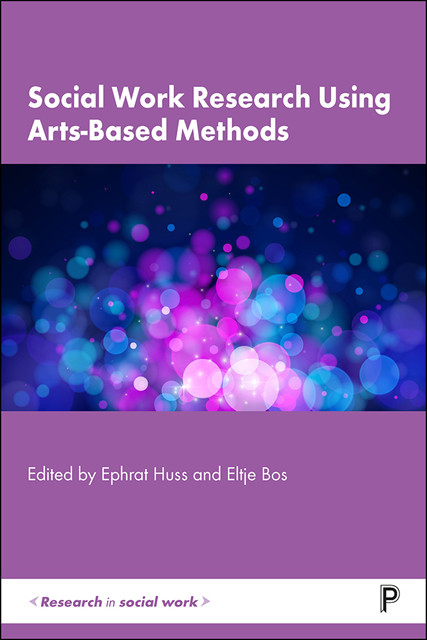Book contents
- Frontmatter
- Dedication
- Contents
- List of figures and tables
- Notes on contributors
- Introduction
- Section I Arts-based research as a method to understand and give voice to marginalised groups
- Section II Using arts-based research to listen to, and give voice to, children in social work
- Section III Arts-based research as a way for researchers and community members to understand communities
- Epilogue
- Index
13 - A/r/tography, rhizomatic storytelling, and ripple effects mapping: a combined arts-based and community mapping methodology to evaluate the impact of COVID-19 expressive arts support groups for frontliners in the Philippines
Published online by Cambridge University Press: 13 October 2022
- Frontmatter
- Dedication
- Contents
- List of figures and tables
- Notes on contributors
- Introduction
- Section I Arts-based research as a method to understand and give voice to marginalised groups
- Section II Using arts-based research to listen to, and give voice to, children in social work
- Section III Arts-based research as a way for researchers and community members to understand communities
- Epilogue
- Index
Summary
Introduction
The oppressive arrival of COVID-19 has had a significant socio-economic impact particularly on low-to middle-income families in the Philippines, leading to a plethora of mental health issues that exacerbate family living conditions (Malindog-Uy, 2020). Psychosocial support has been a great need.
Magis Creative Spaces, in partnership with ABJ Foundation, implemented an initiative to provide Duyan (‘cradle’ in English) groups: free online expressive arts-based psychosocial support groups for various groups of frontline workers. Focusing on the education, health care, and social welfare sectors, a total of 180 participants took part. In parallel, Magis also initiated a research project to document this initiative.
A pool of ten facilitators was arranged in pairs to create a team for each Duyan support group. A general sample of each session's process is as follows: (1) a moment of stillness and silence to offer prayers of healing and gratitude; (2) the introduction of facilitators and participants; (3) a grounding exercise; (4) an art activity (visual art, movement, music or a combination); (5) sharing and discussion; (6) discussion and questions; (7) group photo; (8) closing.
Co-authors Alfonso and Atayde, supervising clinicians for the project, organised all stakeholders of the initiative and reviewed key components of the programme. After each of the Duyan support groups were completed, all facilitators were involved in a post-Duyan session group process to harvest stories through drawing and storytelling.
Arts-based methodology
A combination of research processes allowed for multiple layers of data gathering. From traditional methods of data collection such as questionnaires, verbatim recordings, to arts-based and experiential methods such as a/r/tography, storytelling, and ripple effect mapping, all perspectives had an important role in documenting and evaluating the programme's impact.
Arts harvesting as data collection: merging an artistic and scientific perspective
Leavy (2014) describes how creative researchers have forged synergistic blends of art and science through a variety of artistic genres. Writing as inquiry has provided powerful examples of how to shift the dialogue about various relevant sociological issues, using lyrical form (Leavy, 2014). Narrative storytelling and visual art have become increasingly accepted, innovative approaches to bridging the growing gap between practice and research (Scott et al., 2013).
- Type
- Chapter
- Information
- Social Work Research Using Arts-Based Methods , pp. 148 - 161Publisher: Bristol University PressPrint publication year: 2022



